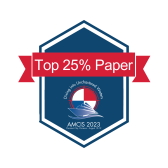Loading...
Paper Type
Complete
Description
Considered a new paradigm in healthcare, AI is expected to change diagnostic medicine in the coming decades. However, its future is still uncertain - partly because it is an emerging technology being gradually applied to a mature field of medicine. We conducted a global cross-sectional survey with more than 1,400 authors of recent scientific publications indexed by the Web of Science to foresee the future of AI in diagnostic medicine. Most respondents expect AI to change diagnostic medicine in this decade radically. In this period, the two most likely outcomes are reduced screening costs and increased diagnostic reliability. X-ray diagnosis and heart rhythm interpretation are the two diagnostic tools most likely to be integrated with AI. The two main barriers are the difficulty of incorporating it into clinical practice and the ethical-regulatory issues. Respondents’ expectations align with the literature and suggest that AI may substantially change diagnostic medicine within this decade.
Paper Number
1609
Recommended Citation
Cabral, Bernardo P.; Castro, Leonardo; Fornazin, Marcelo; Penteado, Bruno Elias; Luís Freire de Castro Silva, Sandro; Braga, Luiza Amara Maciel; Filho, Carlos Gilbert Conte; and Mota, Fabio Batista, "Artificial Intelligence applications in diagnostic medicine: a decade of expectations" (2023). AMCIS 2023 Proceedings. 14.
https://aisel.aisnet.org/amcis2023/sig_health/sig_health/14
Artificial Intelligence applications in diagnostic medicine: a decade of expectations
Considered a new paradigm in healthcare, AI is expected to change diagnostic medicine in the coming decades. However, its future is still uncertain - partly because it is an emerging technology being gradually applied to a mature field of medicine. We conducted a global cross-sectional survey with more than 1,400 authors of recent scientific publications indexed by the Web of Science to foresee the future of AI in diagnostic medicine. Most respondents expect AI to change diagnostic medicine in this decade radically. In this period, the two most likely outcomes are reduced screening costs and increased diagnostic reliability. X-ray diagnosis and heart rhythm interpretation are the two diagnostic tools most likely to be integrated with AI. The two main barriers are the difficulty of incorporating it into clinical practice and the ethical-regulatory issues. Respondents’ expectations align with the literature and suggest that AI may substantially change diagnostic medicine within this decade.
When commenting on articles, please be friendly, welcoming, respectful and abide by the AIS eLibrary Discussion Thread Code of Conduct posted here.




Comments
SIG Health